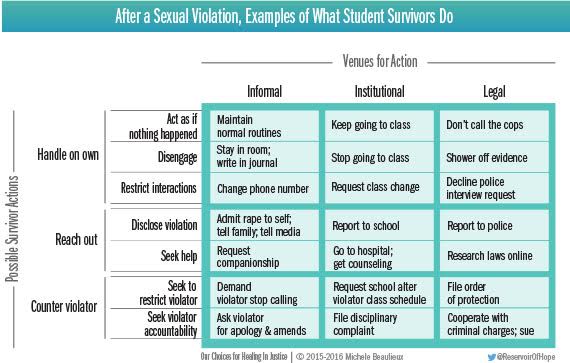
After detailing in court the sexual abuse he endured at the hands of the former U.S. Speaker of the House, Scott Cross is being hailed for his exceptional bravery. But what does it say about our society that Cross needed extraordinary courage to speak at the sentencing hearing of his high school wrestling coach, Dennis Hastert? Do we want to live in a world in which crime victims do not feel comfortable sharing their stories?
Cross is the only victim of Hastert who has publicly identified himself. Three others spoke to investigators but chose to remain anonymous and, most likely, others are keeping their silence. For survivors, determining what to do and where and how to do it can be daunting. A matrix of possible actions across the possible venues for those actions provides an organized way for survivors to visualize decisions and track their journeys. It can also help the rest of us understand the dilemmas that Hastert's and other victims face. The graphic, "After A Sexual Violation, Examples of What Student Survivors Do," is a simplified representation of those myriad alternatives.

In the immediate aftermath of the abuse and for years afterward as Hastert's popularity and power grew, silence seemed the best and only choice for his victims. Survivors often start by and return to handling the situation on their own. They disengage. They act the same as they always have, like nothing happened. They normalize abnormal experiences. For male survivors, handling the situation on their own is especially appealing. Given society's restrictive models of acceptable male behavior, admitting vulnerability can be tough. Male survivors also often wrongly fear that sexual abuse has implications for their sexual identity.
Hastert's victims were not operating in a vacuum. When survivors choose to reach out, the rest of us play a crucial role in helping survivors come forward. Speaking out publicly as Cross did typically starts with private disclosures. Cross, now a successful suburban Chicago businessperson, hadn't told a soul about the abuse he endured in 1979 until after Hastert's indictment last May. Only then did he open up, first to his family. Army Criminal Investigation Command Supervisory Special Agent Lori Heitman calls a survivor's initial disclosure a "test disclosure." When survivors choose to talk to us, deeming us likely to be sympathetic, we need to honor their tentative tellings. If we want more survivors to come forward, we need to start by believing them.
Luckily for Cross and the rest of us, his test disclosure went well. Without the support of his family, Cross may not have come forward. After the sentencing, Tom Cross, Cross' older brother who had been an Illinois House GOP leader and Hastert protégé, said, "We are very proud of Scott for having the courage to relive this very painful part of his life in order to ensure that justice is done today."
Cross continued to reach out, disclosing the violation and asking for help. Next, he approached the Chicago Tribune on the condition of anonymity. He also sought professional counsel. Eventually convinced that he was not the only victim, he spoke with federal investigators and was identified in court documents as "Individual D." When Hastert had the audacity to ask Tom Cross for a letter of support for the sentencing, Scott Cross decided to reveal his identity and speak publicly in court.
After disclosing a violation, survivors can counter the people who violated them by seeking to hold them accountable. The statute of limitations in Illinois expired, so criminal or civil legal action was no longer an option for Hastert's victims. Responding within the institutional venue of the school system was also no longer realistic. So Individual A sought justice informally from Hastert in the form of financial compensation. Federal bank auditors' investigation of Hastert's large cash withdrawals eventually uncovered the decades-old sexual abuse. For Cross, disclosing Hastert's sexual abuse in court and seeking to hold him accountable on the money laundering charges were actions available to him on his path to healing in justice.
Most Americans now believe Hastert abused Cross, Individual A, and others, but many people did not want to believe that sad reality immediately. Survivors are wise to be reluctant to disclose abuse: they typically face resistance when they do. Acknowledging how difficult it can be to accept that seemingly good people can do bad things, University of Chicago Head Wrestling Coach Leo Kocher is now sorry for the letter he wrote supporting leniency in Hastert's sentencing. "Like many people I did not want to believe these allegations about someone whom I respected. In light of the recent confirmation of detailed allegations, I now deeply regret my decision seven weeks ago to submit this letter and to write it on University of Chicago Wrestling Program letterhead. I have only sympathy for the victims in this case," Kocher said.
To come forward, survivors should not have to be exceptionally brave in the way that Scott Cross was. If we want survivors to speak out in days rather than decades, we need to start by believing them. Ultimately, it's on us.
This post is part of a series on decision-making in the wake of sexual violations. The matrix, "After A Sexual Violation, Examples of What Student Survivors Do," is part of Our Choices for Healing In Justice, a decision explorer empowering people impacted by sexual violations.